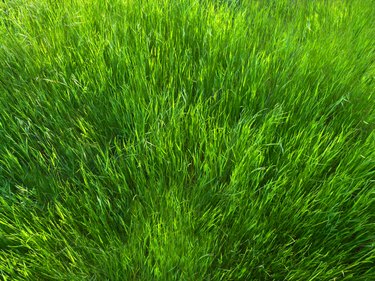
Though its rich, green color and attractive texture have made Kentucky bluegrass (Poa pratensis) one of the most widely grown lawn grasses in the U.S., this species is known for slow germination and establishment. It grows in U.S. Department of Agriculture plant hardiness zones 2 through 6. Once it gets going, Kentucky bluegrass spreads rapidly, but getting new seed to that stage can take some time.
Germination for Kentucky bluegrass generally takes two to five weeks, depending on many factors. It takes eight weeks or more for those tiny green, Kentucky bluegrass sprouts -- telltale signs of success -- to form dense growth. While some Kentucky bluegrass varieties may germinate more quickly than other varieties under perfect conditions, germination speed in your real-world lawn depends heavily on several factors.
Video of the Day
Video of the Day
Best Time to Plant
Kentucky bluegrass is what's known as a cool-season grass. Its most vigorous growth periods occur during the cool seasons of spring and fall.
Late summer to early fall is generally considered the optimal time for planting Kentucky bluegrass. Grass seeds typically germinate in 14 to 30 days, advises the University of California.
Warm-season weeds slow down and provide less competition for water and nutrients meant for germinating grass seeds. Many diseases are less active as well, and autumn temperatures and rainfall encourage faster germination. Spring is the second best planting time, but you'll often need more seed to get the same results.
Kentucky Bluegrass Germination Temperature
In fall, the air temperatures and soil surface temperatures stay in close alignment, unlike spring, when soil can be much colder than surrounding air. Kentucky bluegrass germinates best when soil temperatures near 60 degrees Fahrenheit, but soil temperatures aren't the only consideration.
Kentucky bluegrass is one of several grasses that have alternating temperature ranges for optimum germination. The grass seed germinates best when daily temperatures alternate. For Kentucky bluegrass, the optimum germination occurs when the seed has approximately 16 hours of temperatures near 59 F followed by approximately eight hours of temperatures at 86 F. This corresponds well with the moderate days and cool nights of fall.
Soil Moisture Requirements
Established turf generally needs 1 to 1 1/2 inches of weekly water from natural precipitation or supplemental watering, best delivered in one to two sessions. The grass is not drought tolerant and may struggle in hot weather, so more frequent irrigation is recommended in the summer to prevent the grass from going dormant, advises the University of California.
Germinating seeds need more frequent, light watering for constant moisture. This is especially important immediately following germination because undeveloped new roots can't process water the way established grass can. Without proper watering, the seeds won't germinate or the sprouts will die.
Newly seeded lawns should be watered daily or more, if needed, to keep the top 1/2 inch of soil moist until the new grass reaches 1 inch tall. Once it reaches that height, water every other day until the grass is well established, and then water as you would a mature lawn. If germinated seeds or seedlings are allowed to dry out, they may die.
Other Factors and Considerations
Many other genetic, environmental and cultural factors can impact the speed of Kentucky bluegrass germination, whether a variety is considered relatively fast or slow. The following are just a few of those factors that affect germination:
- Age of the seed
- Seed maturity at harvest
- Cultivar type
- Prevalent diseases
- Proper planting depths
- Competition from weeds
- Competition from faster-germinating grasses
- Hot weather
- Drying winds
- Pre-planting seed treatments
By giving your Kentucky bluegrass seed the best possible conditions, regardless of the varieties, you can help ensure your seed germinates as quickly as possible under the given conditions.